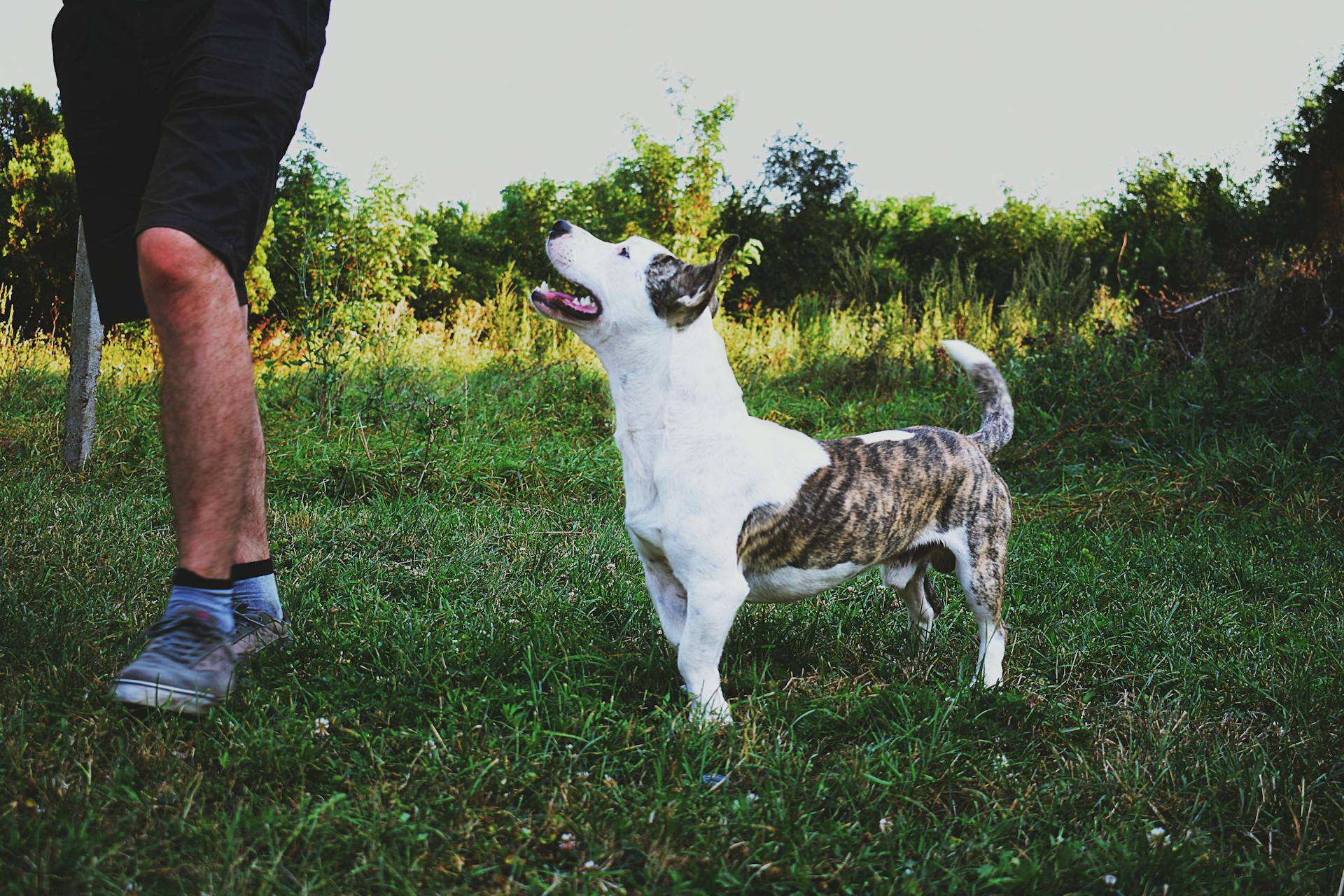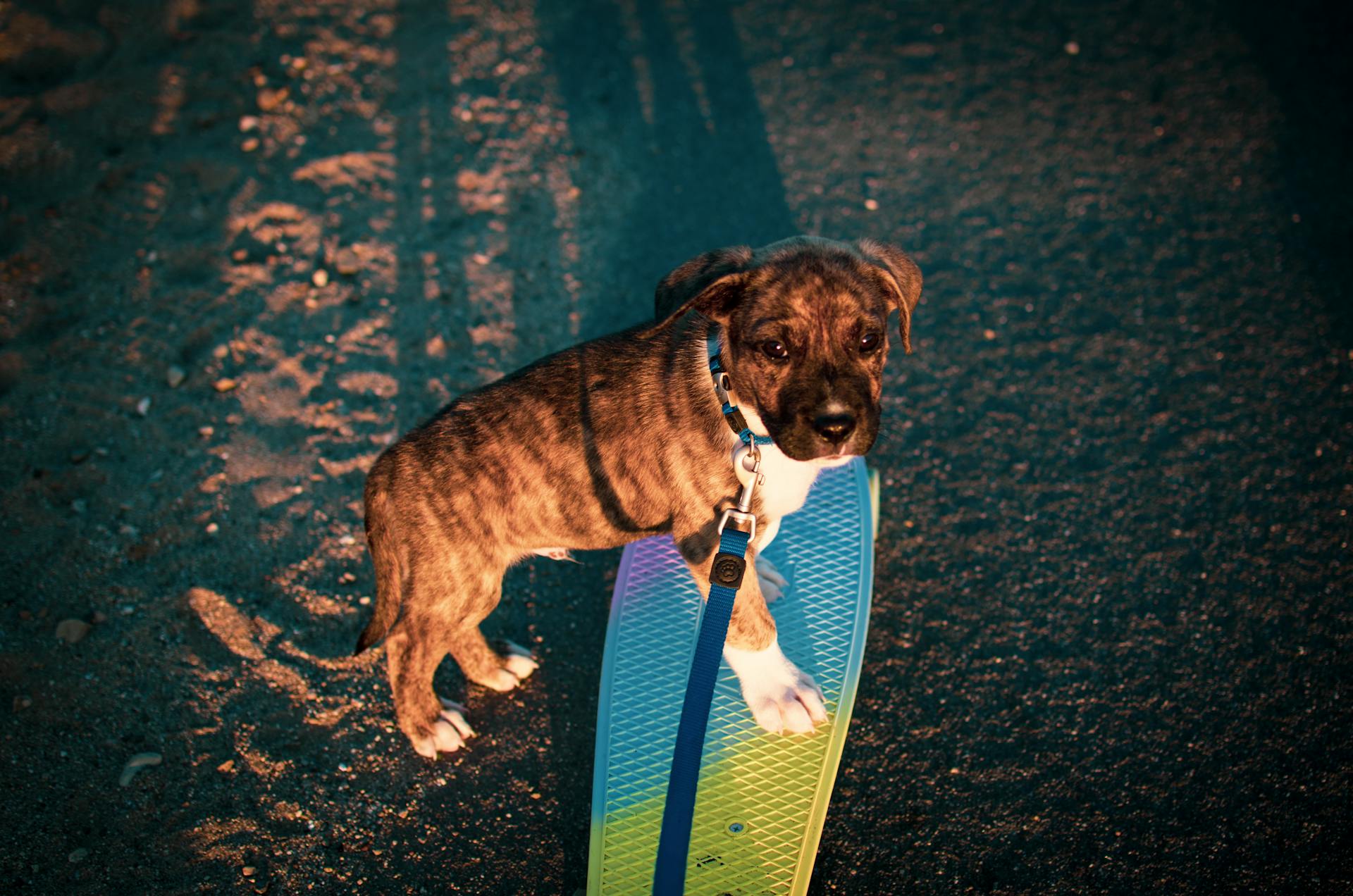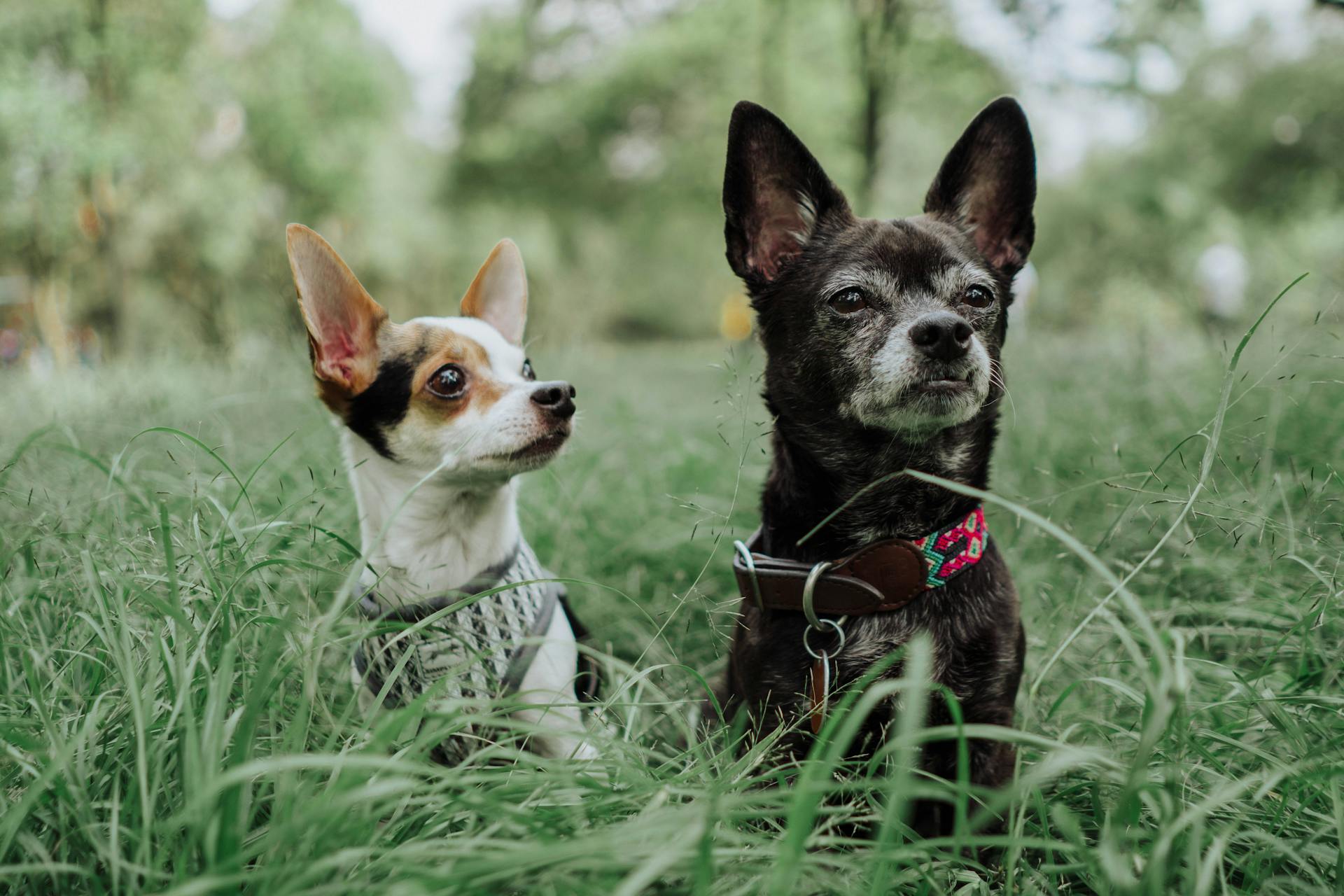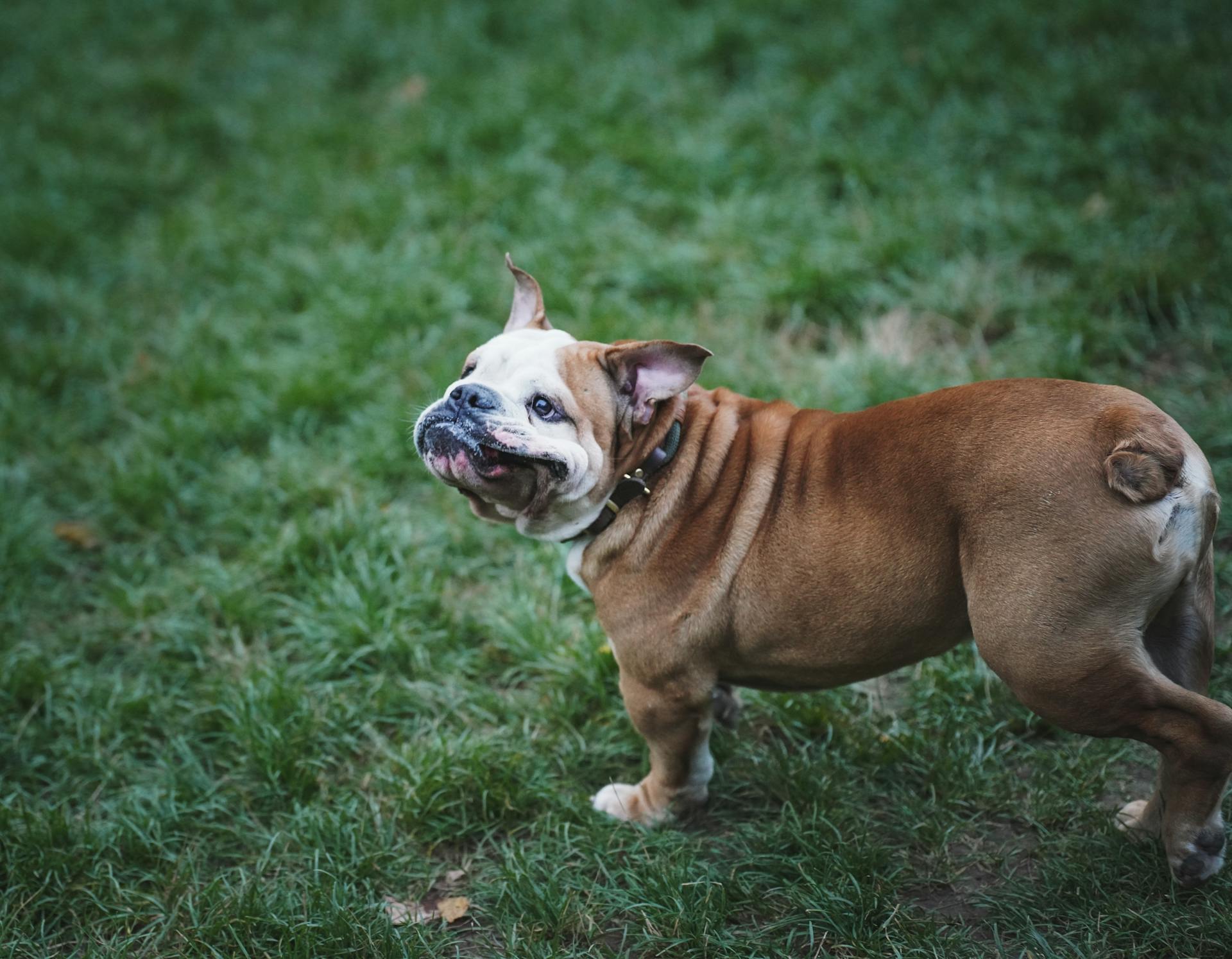
The Old English Bulldog Brindle is a unique and captivating breed. They have a distinctive brindle coat pattern, which is a result of a specific genetic combination.
Their brindle coat is characterized by a mix of black and fawn stripes, giving them a striking appearance. This pattern can vary in intensity and distribution, but it's a key feature of the breed.
Old English Bulldog Brindles are known for their gentle and affectionate nature, making them great family pets.
For more insights, see: Schnauzer Pattern
History
The Old English Bulldogge has a fascinating history that dates back to the early 1970s when David Leavitt, from Pennsylvania, started his project to recreate the "Regency Period Bull Baiter".
David Leavitt's goal was to create a dog with the look, health, and athleticism of the original bull-baiting dogs, but with a much less aggressive temperament. He used the cattle line breeding scheme of Dr. Fechimer from Ohio State University to achieve this.
Readers also liked: Leavitt English Bulldog
The foundation crosses consisted of one-half Bulldog, one-sixth American Bulldog, one-sixth Bullmastiff, and one-sixth of other breeds. This unique blend of breeds resulted in the emergence of the Olde English Bulldogge.
In 1971, Leavitt began his project, and after many planned crosses, the breed began to breed true. This means that the characteristics of the Olde English Bulldogge were consistent and predictable.
The Olde English Bulldogge Association (OEBA) was formed by Leavitt to maintain the breed's stud book and issue registration papers to future offspring. Leavitt worked closely with Ben and Karen Campetti from Massachusetts in breeding the breed.
In 1993, Leavitt stopped breeding and turned the OEBA registry and his personal breeding stock over to Working Dog Inc., owned and operated by Michael Walz of Pennsylvania. The Olde English Bulldogge Kennel Club (OEBKC) was formed in 2001 and eventually merged with the OEBA in 2005.
The breed was enrolled with the Canine Developmental Health and Performance Registry (CDHPR) in 2008, which evaluated the breed for recognition within the UKC as a purebred breed of dog. The UKC recognized the Olde English Bulldogge as a fully recognized breed in 2014.
Discover more: Bull Terrier Dog Breeds
Appearance
The Olde English Bulldogge's appearance is truly impressive. They are a muscular, medium-sized dog with great strength and fluid, agile movement.
Their well-balanced and proportioned physique makes them capable of performing without any breathing restrictions in extreme temperatures. Serious faults include excessive wrinkle and lack of pigment around their eyes, nose, or mouth.
The skull is large and well-proportioned to their muscular body and prominent shoulders. A defined furrow between the eyes is a characteristic feature.
Narrow skull and domed forehead are considered faults. The muzzle is square, wide, and deep, with a lower jawbone that is moderately curved from front to back.
Their nostrils are wide, with a line running vertically between them from the tip of the nose down to the bottom of the upper lip. The nose is large and broad in relation to the width of the muzzle.
The eyes are medium in size and almond-shaped, ranging in color from dark to light brown, with black pigmented eye rims. They are set wide and low, level with the top of the muzzle.
Their ears are small, and rose is the preferred shape. They are set high, wide, and to the back outer edge of the skull.
A fresh viewpoint: American Bully Skull
Temperament and Personality
The Olde English Bulldogge's temperament is truly one of a kind. They are fearless protectors, making them a perfect watchdog, but also docile and friendly, making them an excellent family pet.
They love to play and are high-spirited, never shy away from snuggles or work. An overly shy Olde English Bulldogge is considered a breeding fault, likely from poor socialization in puppyhood.
This breed is highly adaptable and can thrive in almost any lifestyle, but they do require some protection from extreme cold and heat. They are not as susceptible to heat as the AKC Bulldog, but still need to be monitored.
Here are some key temperament traits of the Olde English Bulldogge:
Olde
The "Olde" in Olde English Bulldogge refers to the breed's historical roots and its aim to revive the characteristics of the old English bulldog. They are docile, capable, and protective, making them excellent companions.
One of the key characteristics of the Olde English Bulldogge is its strong instinct to protect its family and property. It's fearless and athletic, and will not back down from a challenge.
Olde English Bulldogges are generally good with kids, earning a 4-star rating for child-friendliness. However, they do require supervision and socialization to ensure a harmonious household.
In terms of exercise needs, Olde English Bulldogges require daily pack walks to satisfy their migration instinct. This breed is not suited for long-distance running or high-impact activities.
Their grooming needs are relatively low, with an average shedding level. A rubber brush can help remove dead hairs during shedding season.
Olde English Bulldogges are not hypoallergenic, and their health issues are a concern. However, responsible breeders like those affiliated with the Leavitt Bulldog Association prioritize the health and well-being of their dogs.
Here's a summary of the breed's key traits:
Temperament & Intelligence
The Olde English Bulldogge is a breed known for its friendly and outgoing personality. They're often described as docile and fearless, making them a great watchdog.
One of the most notable traits of the Olde English Bulldogge is their love for family. They're highly affectionate and playful, especially with children. In fact, they're considered a great breed for families with kids, as they're patient and gentle.
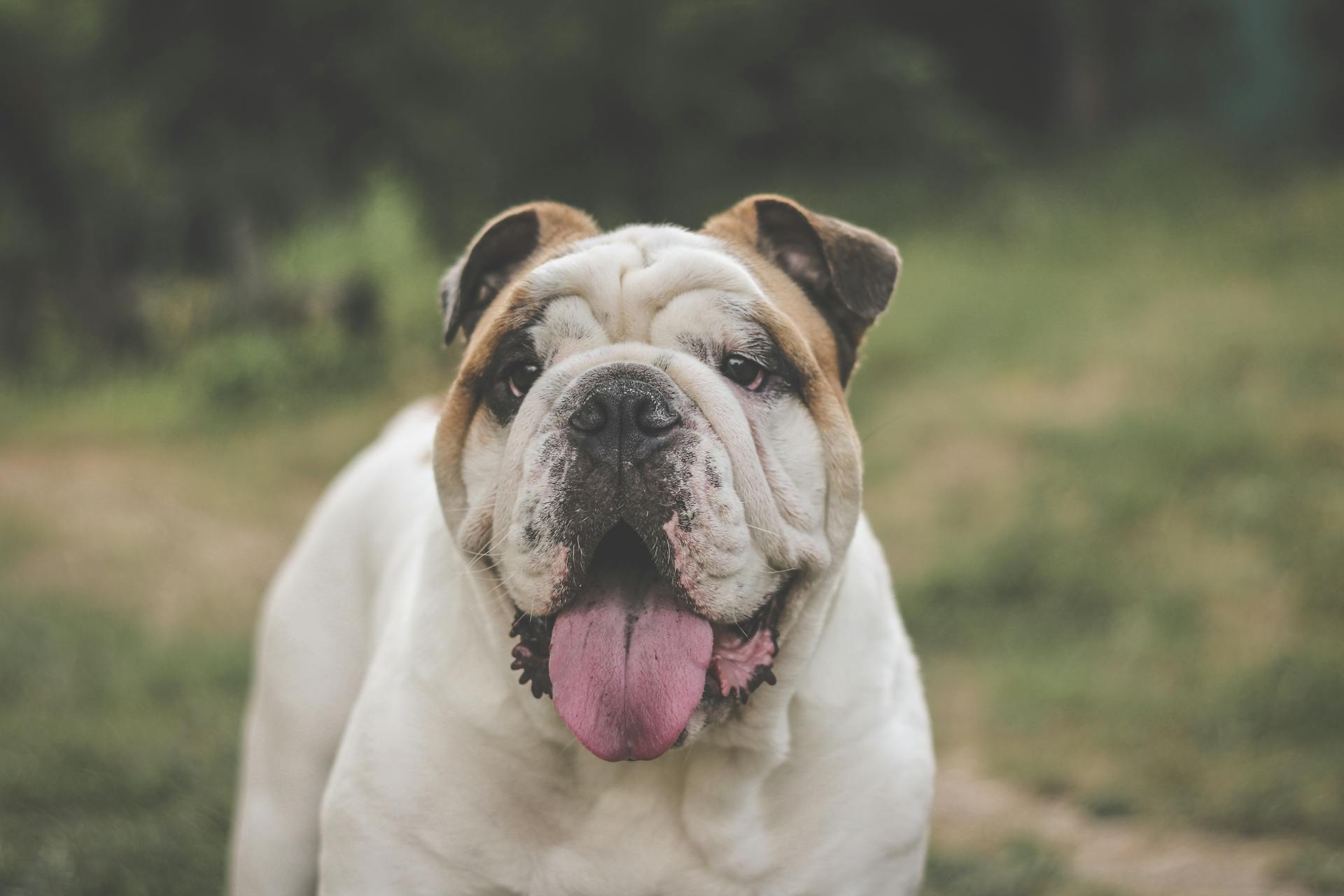
The Olde English Bulldogge is also known for their intelligence. While they may not be the most trainable breed, they're highly sensitive to their handler's tone of voice, making training a relatively simple process.
Here are some key temperament traits associated with the Olde English Bulldogge:
It's worth noting that while the Olde English Bulldogge is generally a friendly breed, they may not get along with other dogs, especially if they're not part of their family. Proper socialization is key to ensuring they interact well with other animals.
Grooming
Grooming is an essential part of owning an Old English Bulldog Brindle.
They shed moderately, so brush their coat once a week to maintain the shine. Brushing also helps prevent matting and tangling.
Bathe your Old English Bulldog Brindle when needed, taking care to use a pet-safe shampoo.
Trim their nails regularly to prevent overgrowth, which can be painful and lead to health issues.
A fresh viewpoint: Dogs Breeds That Start with B
Cleaning their wrinkles is crucial, especially if they have a lot of them. Weekly cleanings will help keep them dry and prevent skin infections.
Ear cleanings and nail trims are also essential, and can be done at the same time as wrinkle cleanings.
Their medium-short coats require no special care, but it's a good idea to wash them once a month or whenever they get dirty.
Health and Conditions
The Olde English Bulldogge is considered a healthier breed than many modern bulldog breeds, thanks in part to its genetic diversity. This is in contrast to some other bulldog breeds that have been bred extensively inbreeding, which can lead to a range of health problems.
In fact, a 2016 study published in the journal Canine Genetics and Epidemiology found that the Olde English Bulldogge could be used as an outcross candidate to introduce new genetics and correct some of the problems associated with inbreeding.
However, it's worth noting that all dogs, regardless of breed, can still develop certain health issues. These can include allergies, dental disease, obesity, tick and flea-borne illnesses, and more.
Proper veterinary care, nutrition, and regular grooming sessions can help prevent these common ailments. By working with a reputable breeder and providing your dog with the care it needs, you can help ensure that your Olde English Bulldogge stays healthy and happy.
Some potential health issues that may affect your Olde English Bulldogge include hypothyroidism, heart disease, and obesity.
Here's an interesting read: English Bulldog How to Take Care
Food and Diet
English Bulldogge owners know that feeding their furry friends the right food is crucial for their overall health. Good quality dry dog food coupled with a nutritious homemade meal can keep your English Bulldogge healthy.
English Bulldogges are active dogs and need high-calorie dog food to meet their energy requirements. High-quality dog food rich in protein, fatty acids, and probiotics is a great choice.
If you're unsure about what to feed your English Bulldogge, consult your vet for specific recommendations tailored to their breed. They can help you make informed decisions about your dog's diet.
A fresh viewpoint: Best Food for Olde English Bulldog
Exercise
The Olde English Bulldogge is a versatile breed that can adapt to any lifestyle. They'll happily go on a run with you or snuggle up on the couch, making them easy to please.
Daily exercise is a must for these dogs, as they're generally pretty active. A long walk, run, or a simple game of fetch will do the trick.
Luckily, Olde English Bulldogges can withstand heat and cold much better than the modern English Bulldog, so you don't need to worry about overheating as much.
Compatibility with Other Pets
Olde English Bulldogges are generally good with all pets, including small ones, but it's essential to be mindful of prey animals.
They tend to show occasional same-sex aggression with other dogs, but a little training can fix this issue.
These dogs are compatible with other pets, but it's crucial to socialize them well to ensure a harmonious household.
If this caught your attention, see: Pit Bulls as Pets
Owning a Bulldog
Bulldogs can weigh between 40-55 pounds and stand about 10-14 inches tall.
Their short, easy-to-maintain coats require only occasional brushing.
Bulldogs are known for their affectionate nature and make great family pets.
They can be prone to health issues such as respiratory problems and skin infections.
Bulldogs need regular exercise, but short walks and playtime are sufficient due to their brachycephalic nature.
Their calm demeanor makes them a great choice for apartment living.
Bulldogs are relatively low maintenance when it comes to grooming, but their wrinkles do require regular cleaning to prevent skin infections.
Featured Images: pexels.com
